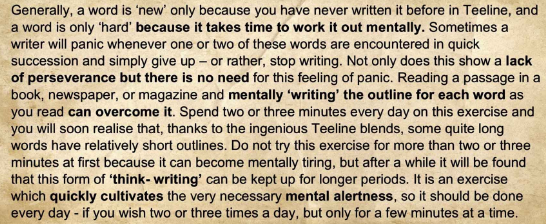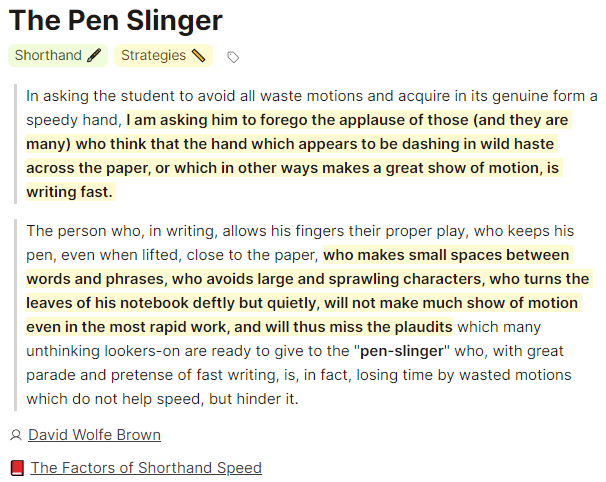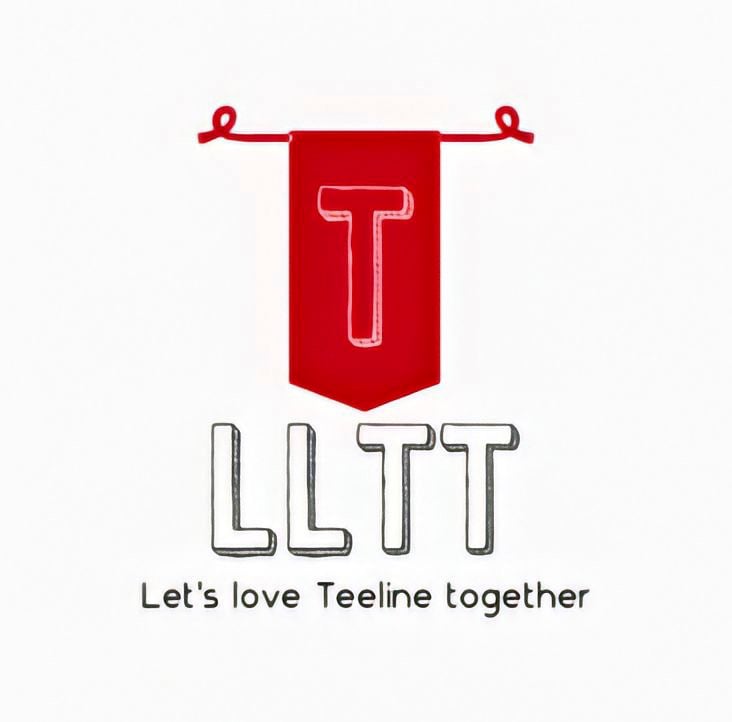LLTT Newsletter - December 2024

LLTT - December 2024
Season's Greetings and Best Wishes for the New Year!
From our cosy corner of the UK to yours, sending you the warmest wishes for a brilliant 2025.
As we wrap up 2024, this month's newsletter explores more strategies to enhance your shorthand journey. First, we'll dive into how the concept of agency can transform your learning approach. We will then revisit ways to incorporate "think-writing" into your daily routine, and finally, we will provide links to two noteworthy articles related to shorthand that are worthy of your consideration.
Being More Agentic: The Secret Weapon for Learning Shorthand
Before we dive into the fascinating world of Teeline shorthand through the lens of personal agency, we encourage you to read Cate Hall's illuminating article "How to be More Agentic." Her insights into ‘agency’ – our capacity to act independently and make free choices – lay the foundation for what we'll explore here.
Why start with an article about agency when we're discussing shorthand? Because mastering Teeline isn't just about memorising symbols and rules. It's about taking control of your learning journey, making deliberate choices, and developing a mindset that transforms shorthand from a daunting challenge into a conquerable skill. You should find the intersection of agency and shorthand learning reveals surprising insights that could accelerate your progress.
Learning shorthand is often viewed as a daunting challenge, with many seeing it as a skill that some people are naturally suited for while others aren't. But what if the key to mastering shorthand isn't innate talent, but rather your approach to learning itself? Enter the concept of agency – what Cate describes in her article as a "manifest determination to make things happen."
Embracing the Moat of Low Status
One of the biggest hurdles in learning shorthand is what Hall calls "the moat of low status" – that uncomfortable period where you're consciously incompetent. In shorthand, this manifests as the stage where you're painfully slow, your outlines look messy, and you struggle to read back what you've written. Many potential shorthand writers give up here, unwilling to endure this period of apparent regression.
But as the shorthand expert Harry Butler noted many times in his day, "You cannot dilly-dally with shorthand and make a success of it." The most agentic approach is to embrace this challenging period, understanding that wading around in the moat is exactly what leads to improvement. Instead of being embarrassed about your initial struggles, view them as evidence that you're pushing your boundaries appropriately.
Court Rejection, Seek Real Feedback
An agentic approach to shorthand means actively seeking feedback on your outlines and reading ability. This might feel uncomfortable – nobody enjoys having their mistakes pointed out – but it's crucial for improvement. The traditional advice in Teeline textbooks often focuses on solitary practice, but an agentic learner might:
- Record themselves reading back their notes to identify weak spots
- Actively seek out more challenging dictation material rather than staying in their comfort zone
Assume Everything is Learnable
One of the most powerful aspects of agency is the belief that skills are learnable rather than innate. This directly applies to shorthand, where different components – speed, accuracy, outline formation, reading back – can all be systematically improved with the right approach.
As James Hill, Teeline's inventor, stated: "If you can write, you can write Teeline." This isn't just encouragement – it's a fundamental truth about the system's learnability. An agentic approach means breaking down the skill into learnable components and tackling each methodically.
Increase Your Surface Area for Luck
While traditional shorthand advice often focuses on solitary practice, an agentic approach might involve:
- Finding different contexts to practice (meetings, lectures, phone calls)
- Experimenting with various practice methods beyond standard dictation
- Connecting with other shorthand writers to share techniques
Don't Work Too Hard (Work Smarter)
Perhaps counterintuitively, being agentic about learning shorthand doesn't mean grinding away for hours. As Hall points out, burnout is "the ultimate agency-killer." This aligns perfectly with traditional shorthand wisdom – "a regular short working period each day is much better, even if it is only for a quarter of an hour."
The agentic approach to practice might involve:
- Setting clear boundaries around practice time
- Focusing on quality over quantity
- Taking regular breaks to maintain mental freshness
- Varying practice methods to maintain engagement
Finding Real Edges
Just as Hall found unexpected advantages in her life and pursuits, there are often overlooked edges in shorthand learning. These might include:
- Focusing on high-frequency words first (the top 100 words make up about 50% of all written material)
- Using modern technology tools to help create personalised practice material
- Developing systematic approaches to building speed rather than just hoping it will come with time
The Path Forward
Being agentic about learning shorthand means taking control of your learning journey rather than just following a prescribed path. It means:
- Setting specific, measurable goals
- Actively seeking feedback and opportunities for improvement
- Being willing to look foolish in the service of learning
- Taking responsibility for your progress rather than waiting to be taught
- Maintaining a growth mindset about your capabilities
Remember, as Hall notes, agency itself is learnable. By applying these principles to your shorthand journey, you're not just learning a valuable skill – you're developing a more agentic approach to learning itself, which will serve you well in all future endeavors.
Think-Writing: A Mental Tool for Shorthand Success
Think-writing isn’t new. In fact, its importance prompted us to include it on our Speed Tips page. But anything worth saying once is worth repeating!

Developing speed and accuracy in shorthand isn't just about putting pen to paper. One of the most powerful techniques in your arsenal is "think-writing" - mentally forming Teeline outlines in your mind’s eye. Let's explore some creative ways to weave this technique into your daily life.
Micro-Moments of Mental Practice
Try these bite-sized opportunities throughout your day:
On your commute: Pick one advert or shop sign at each major junction. Form its Teeline outline in your mind while waiting at traffic lights. Switch it up daily to keep it fresh.
During your tea break: While waiting for the kettle to boil, convert the text on your biscuit packet or tea box into Teeline. The brief waiting time is perfect for quick practice, and you'll likely encounter these items regularly, helping reinforce your learning.
Mental freestyle: Challenge yourself by generating random phrases in your head - anything from "purple elephants dance gracefully" to "mysterious cheese wandered home." Or create a quick storyline like "The tired penguin finally found his missing umbrella beneath a talking cactus." Try to keep up with writing these in Teeline as you think of the words. This method exercises both your creative thinking and your Teeline speed, plus it can be quite entertaining! The more absurd the phrases or stories, the more memorable the practice. As an added bonus, you will usually be pleasantly surprised that many words you think of as “hard” are actually not that difficult to write in Teeline.
At the supermarket: While queuing at the till, practice converting the names of items around you into Teeline. These display stands provide a wealth of short, varied text perfect for mental practice.
Making It Fun
Transform think-writing into an engaging mental game:
The Category Game: Pick a category each day (colours, animals, food items) and mentally form Teeline outlines whenever you naturally encounter words from that category.
The Meeting Name Game: As colleagues join a meeting, mentally form Teeline outlines of their names. This keeps your mind engaged whilst avoiding the mental strain of continuous practice.
The News Headline Challenge: Read just two or three headlines during your breaks and convert it to Teeline in your mind. This gives you practice with current, relevant vocabulary.
In short, work on leveraging the natural pauses in your day. These brief windows of time can provide perfect opportunities for quick mental outline formation without overwhelming your brain.
Start small: Begin with just one or two think-writing moments per day
Stay relaxed: Don't pressure yourself to form perfect outlines
Mix it up: Alternate between simple and more challenging words
Pay attention to how you feel: If you experience mental fatigue, take a break. However, note that if you do feel yourself getting “tired” during your think-writing session, you are doing it correctly! 😀
Remember, the goal isn't to spend hours on think-writing. Instead, we're aiming to build natural, effortless connections between words and their Teeline outlines. These micro-practices, spread throughout your day, will significantly improve your shorthand abilities!
Two “season appropriate” posts from last year:

Buying a Christmas Tree - 60 WPM
Dec 15, 2023 - Jo Goodall - This 60 paper focuses on Distinguishing Outlines, Special Outlines and Word Groupings you should know.

Buying a Christmas Tree - Speed Development
Dec 22, 2023 - Jo Goodall - The dictated speed here is irrelevant. What is important is that you push yourself beyond your comfort zone.
Worthy of Note
There were two newsworthy items we found this month we’d like to pass along.
Firstly, there was an article by Andrew Hill in Tiro - The Journal of Professional Reporting and Transcription entitled “Shorthand in Journalism - A Dying Art?”
Now, this is a topic that has been addressed many times over the years by many different people and while Mr. Hill brings up some of the old, familiar arguments (that is, in support of shorthand), his points about accuracy and reliability, as noted below, are new to the discussion:
Provides accurate written records that can't be easily altered (unlike digital recordings)
Could become more important as AI deepfakes make recordings potentially less reliable
Helps maintain the "gold standard" of British journalism regarding verbatim quotation
For these reasons alone, it is worth the read.
Secondly, in October 2024, DeGruyter quietly published “New Approaches to Shorthand: Studies of a Writing Technology,” marking it as the first ever peer-reviewed volume on the subject.
MLA Citation: Boeddeker, Hannah and McCay, Kelly Minot. New Approaches to Shorthand: Studies of a Writing Technology, Berlin, Boston: De Gruyter, 2024. https://doi.org/10.1515/9783111382692
While Teeline is not specifically mentioned, the book, available for free in both PDF and EPUB formats (as well as being sold in hardcover for ± £88) explores how examining previously neglected writing systems reveals diverse and vibrant writing cultures across different time periods, social contexts, and linguistic traditions.
The book’s description is as follows:
Variously identified as an art, a technology, and a professional prerequisite, forms of shorthand have been in use from Antiquity to the modern day. Far from a niche corner in manuscript studies, shorthand represents an almost global phenomenon that has touched upon many aspects of everyday life and of scholarship. Due to its immediate illegibility, however, and the daunting task of decipherment, shorthand has long been neglected as a research object in its own right. The immense quantity of extant and unread shorthand manuscripts has been downplayed, as has the technology’s place in cultures of learning, religious devotion, court practice, parliamentary procedure, authorial composition, corporate life, public and private writing, and the academy. As the first ever peer-reviewed volume on the subject, this book presents a much-needed introduction to shorthand, its history, and its disparate historiography, alongside eight contributions by shorthand specialists that showcase some of the many lines of inquiry that shorthand inspires across a range of disciplinary and methodological perspectives. For readers with a vested interest in shorthand, this volume provides a range of approaches to shorthand in the Latin West, from the Middle Ages to the nineteenth century, upon which to orient, substantiate, and inform their own work. For general readers, this publication invites scholars to consider ways in which historically overlooked or underestimated forms of writing facilitated a variety of writing cultures in different contexts, periods, and languages.
Be sure to visit us at the LLTT Website, YouTube, Facebook, Instagram, Quizlet and Soundcloud.
If you’re looking for Teeline reading practice, Skill Building Through Reading 📗 - is available for purchase online.
Much work (and ❤️!) has gone into this 48 page, 6”x9" softcover book:
Five 5️⃣ carefully selected passages: Improve your sight 👁️ recognition of outlines and word groupings.
Dual Format: Each passage includes both printed Teeline and the longhand ✍️ transcription.
Proven Learning Approach: Reading printed 🖨️ shorthand is a method long-favoured by skilled practitioners.
Whether you're a student, journalist, or professional seeking to improve your note taking, this book will be a valuable addition to your Teeline learning resources.
To order, please visit the book’s landing page or respond to this email with any questions.
If you find this newsletter helpful, please help us spread the word and forward to a friend!
A Parting Thought


Add a comment: